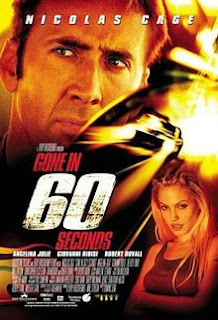
Gone in 60 Seconds is a 2000 American action film, starring Nicolas Cage and Angelina Jolie. Randall "Memphis" Raines (Nicolas Cage), a retired master car thief, is forced to return to Los Angeles to steal 50 cars in 72 hours for British crime boss Raymond "The Carpenter" Calitri. Raymond is threatening to kill Memphis' younger brother, Kip, after Kip and his associates did not make the deadline to deliver the stolen cars.
The reason I suddenly thought about that movie was because earlier today, I was listening to a speech by a speaker and even though he was doing his best, he was losing his audience's interest....fast.
So I want to share with you 3 things that you can do if you want to lose your audience....fast!
No. 1
Bore them with facts.
The speaker was speaking about travelling. He was telling the audience about the benefits of travelling. Yawn....we all know about the benefits of travelling. Who cares?
Instead of telling us the benefits, why not share with us the adventures that you had gone through while travelling? Tell us an exciting story about one of your travels and we will be your fans.
Once you shared your travelling stories and adventures with your audience, the audience themselves will be convinced of the benefits of travelling, without you having to tell them.
No. 2
Keep a serious face
Seriously, you got to loosen up your facial expression if you want the audience to stay with you throughout your speech. Audience switch off their attention when they are feeling uncomfortable and nothing is more uncomfortable than looking at a speaker who has a serious face on throughout his speech.
So please, smile a little more and you will notice that the audience will want to warm up to you :)
No. 3
I, I , I....We, We, We
Using too many I's and We's in your speech will not engage the audience. Consider these 2 sentences. Which one do you think is better at engaging the audience?
a) Ladies and Gentlemen, when we travel, we get to enjoy a different view of the world.
b) Ladies and Gentlemen, when YOU travel, YOU get to enjoy a different view of the world.
Remember, less I's and We's. Use more You's. (It rhymes...yeah!)
So there you have it.
3 fast and easy ways for you to lose your audience. Do it and your audience will be gone in 60 seconds.
Speak to Inspire and Be Inspired,
Bernard Yong




